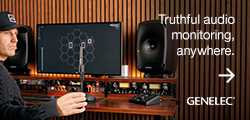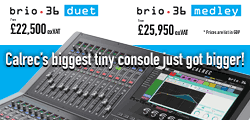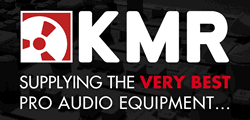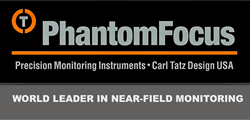Audified promises ‘risk-free’ recording with the new RecAll multichannel MacOS application.
 Developed in Cocoa, directly accessing Core Audio, RecAll addresses recording live and on the road without the time involved in DAW preparation. Reality dictates that when working sound reinforcement events there is often time available for ancillary recording. Although most DAWs can be set up to record multichannel events, configuring them to do so is never a straightforward event in itself. Correspondingly, using RecAll involves opening the application, selecting the set-up from the template menu, and hitting Record.
Developed in Cocoa, directly accessing Core Audio, RecAll addresses recording live and on the road without the time involved in DAW preparation. Reality dictates that when working sound reinforcement events there is often time available for ancillary recording. Although most DAWs can be set up to record multichannel events, configuring them to do so is never a straightforward event in itself. Correspondingly, using RecAll involves opening the application, selecting the set-up from the template menu, and hitting Record.
There is no need to spend time repeatedly naming inputs and channels on a DAW as RecAll takes care of that. It also allocates intelligent metering, automatically toggling between the two types available during the recording process. Before recording starts, standard meters show the input level at the time.
When recording starts, the meters show the signal history, so no need to check them constantly, which is especially useful if RecAll’s main window is hidden. Preview recorded tracks with the click of a button. Export the takes into (almost) any DAW for mixing – all the tracks are automatically structured and titled when dragging and dropping the files from each take.
RecAll supports a maximum of 256 stereo and mono channels, all recorded as CAF (Core Audio Format) files – a ‘container’ for storing audio designed by Apple to overcome limitations of older digital audio formats. This structure is not limited to a 4Gb file size, so can theoretically save hundreds of years of recorded audio due to its use of 64-bit file offsets. CAF also allows use of the files to the point where recording stopped, even if forced upon the unsuspecting recordist as a result of unfortunate or unforeseen scenarios, such as running out of disk space on the drive being recorded to or disconnection – accidental or otherwise – of an audio interface. Helpfully, RecAll offers three ways to open a project – one for creating a new project with a fresh hardware connection (selecting the number of stereo and mono channel strips), one for creating a new project with existing hardware (reusing an already-created channel setup, track names, and colours), and, crucially, one to continue working on an already-created project (which is useful if RecAll had to be quit through no fault of its own before continuing with an existing project).
Project configuration adjustments can be made directly from within RecAll’s main window, including adding or removing channel strips, arming channels for recording, and toggling between mono and stereo tracks, while complete configuration is available in the Inspector window, where users can select one or more channel strips to be edited using standard modifiers, such as shift (to select a range of channel strips) and command (to select several strips at any position). Once in the Inspector window, assigning channel strip names and colour, arming channels for recording, toggling between mono/stereo, and assigning channels to the strip remains simplicity itself. It is also worth noting that if multiple tracks end up with the same name, RecAll automatically adds indexes to distinguish between them. Manually reindexing a channel strip is also perfectly possible, in which case RecAll reindexes the rest of the channels strips to ensure unique naming remains intact.
Recording completed, recorded files can be checked from the main window or within the Track Player window (which can be detached from the main bar by dragging it to another position). Press the Play button in the main bar to play the master (mixed) track or press the Play button in individual channel strips to listen to individual input recordings. Alternative takes – part of a recording between pressing the Record and then the Stop buttons (visible to the right of the Project name) – can be heard by using the < or > buttons (or selecting from the Take menu).
RecAll is available to purchase for US$49.00 from Audified’s online shop.









